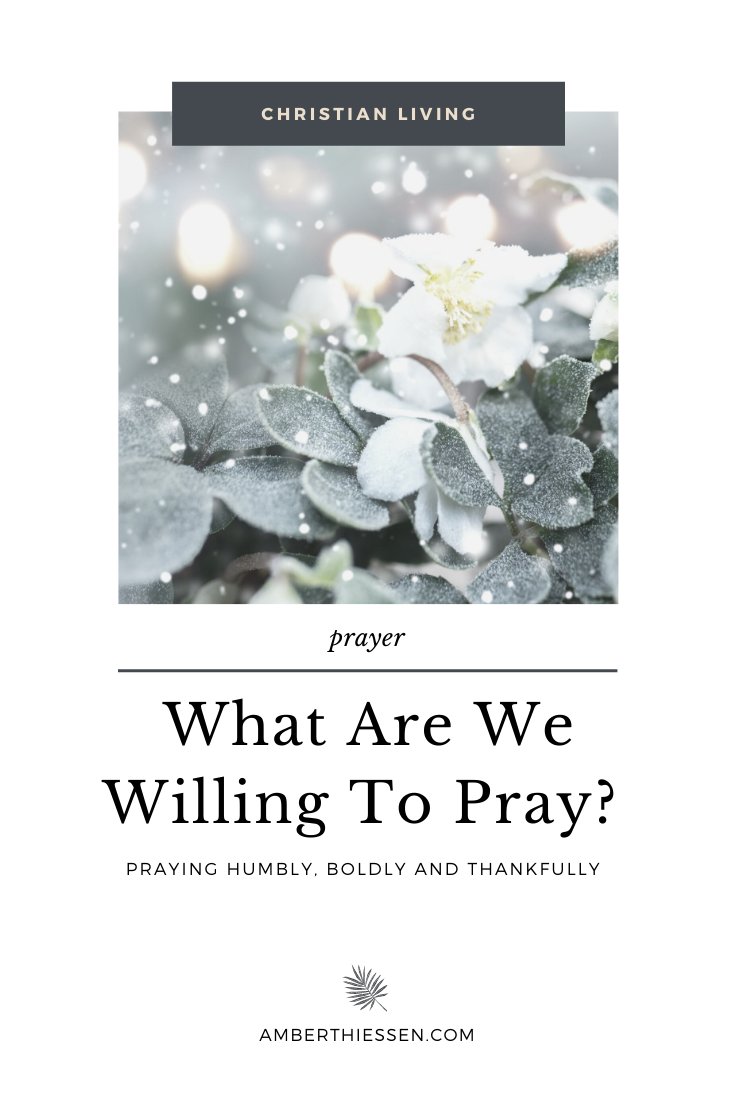What Are We Willing To Pray?
- Amber Thiessen

- Jan 24, 2021
- 3 min read

During a discussion about mid-life forgetfulness, a friend confessed she felt like she was sometimes losing her mind. The night before, leading her family in a familiar prayer, she forgot the words… entirely; mustering up a quiet “…thank-you…” was all she could do.
Her family looked up at her with curious eyes. She couldn’t believe the words of a prayer she’d prayed for 40 years had slipped her mind.
We all had a good chuckle at the story, reassuring her that she did not have early-onset dementia.
And though our words escape us, they are powerful, unveiling hidden spaces of our hearts, “for out of the abundance of the heart his mouth speaks” (Luke 6:45).
The content of our prayers is often longings and desires, pleas for restoration, reconciliation and healing, or requests for discernment and wisdom. David encourages us to, “trust in him at all times, O people; pour out your heart before him; God is a refuge for us. Selah” (Psalm 62:8).
Our prayers are both spoken, and unspoken, and these days more privately than corporately. While perhaps spoken in secret, our prayers reveal what we will ask for, or offer to the Lord. If we look back on our prayer life these last few months, what has it been like?
I’d guess that we have said many prayers along the lines of “make Covid go away” and, “please get my life back to normal.” My own have often been prayers of survival, requesting strength to remain faithful, and courage to be light in a dark world.
These are prayers, mostly surrounding my own well-being, my ministry and my own strength. Admittedly, these are the easiest prayers to pray, because they are on our minds and capture the everyday moments of our day.

What do we pray
While we use the simplest explanation for prayer to teach our children, saying it’s ‘talking to God’, we can build on simplicity and dive into the different facets of prayer.
The Westminster Shorter Catechism defines prayer in this way, “prayer is an offering up of our desires unto God, for things agreeable to his will, in the name of Christ, with confession of our sins, and thankful acknowledgement of his mercies.” [Question 98]
With this fuller explanation of prayer, we see the ease of praying for ourselves, and the challenge it is to pray for those things agreeable to his will, in his name, with confession, and with gratitude.
Circumstances in life are hard to be sure these days. Life is not what it used to be. What would it look like, to willingly offer our requests to God, with surrender and trust in who he is, and what he is doing in the world.
What are we willing to pray?
A bold prayer
A missionary and explorer in southern Africa, David Livingstone endured hardship and suffering in the course of his life. He writes this prayer,
“God, send me anywhere, only go with me. Lay any burden on me, only sustain me. And sever any tie in my heart except the tie that binds my heart to yours.”
Can we pray this bold of a prayer?
Are we willing?
Would we ask the Lord to send us anywhere, knowing that it could be…anywhere? As we pray, are we willing to bear the burdens of the present day, and those to come, with trust in God’s faithfulness to sustain us, through anything?
Can we pray, confessing all the ties in our hearts that tug us away from knowing him more through his Word, with trust that he forgives us, and that he has, and continues, to do a work in and through us?
Living overseas, this prayer became second nature. Everything about life was new, purposeful and intentional, but these are the challenges of my heart lately. The willingness of my heart to submit to the Lord’s sovereignty, to trust his providence, and the courage to know with all my heart that he is faithful in all things, even when I am not.
So, even as we forget the words when we pray, we can remember what the words of our prayers reveal about what we are willing to offer God. Let’s prayerfully consider today, what keeps us from praying boldly, humbly, and thankfully before the Lord.




Comments